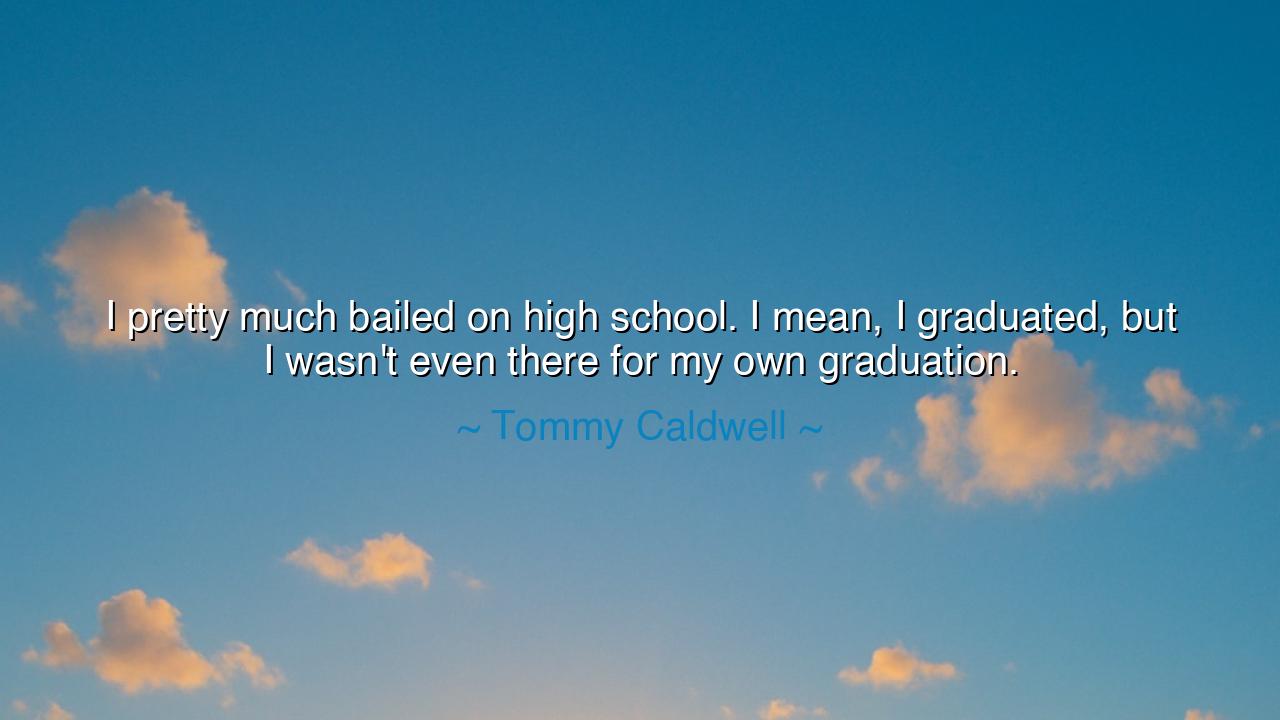
I pretty much bailed on high school. I mean, I graduated, but I
I pretty much bailed on high school. I mean, I graduated, but I wasn't even there for my own graduation.






In the confession, “I pretty much bailed on high school. I mean, I graduated, but I wasn’t even there for my own graduation,” Tommy Caldwell speaks not of rebellion, but of restlessness — the ache of a spirit that could not find its calling within walls of convention. Beneath these simple words lies a timeless struggle: the tension between the education that society prescribes and the learning that one’s soul demands. Caldwell’s statement is not an admission of failure, but a testament to authentic pursuit, to the yearning for a life lived beyond expectation.
Tommy Caldwell, who would later become one of the greatest rock climbers in history, was never meant to be confined by classrooms or ceremonies. His education was carved into stone faces and mountain ledges, where the lessons were written not in textbooks but in endurance, fear, and faith. When he says he “bailed on high school,” he is not rejecting learning — he is rejecting the narrowness of a system that could not contain his curiosity. And when he missed his own graduation, he was already walking another path — one that would lead him to El Capitan, the Dawn Wall, and the summits of human possibility.
The origin of this quote lies in Caldwell’s early life — a boy from Colorado whose father, a mountain guide and gymnast, taught him to embrace the outdoors with courage and humility. While his peers studied formulas and history, Caldwell was scaling cliffs, discovering in the vertical world a mirror for his own spirit. His absence from graduation was symbolic: the ceremony of others could not compare to the initiation of the mountains. There, he would learn not only about risk and failure, but about focus, purpose, and perseverance — lessons that no diploma could confer.
In the style of the ancients, this is the story of a man who found his temple not in marble halls, but in the cathedrals of nature. Like Diogenes, who rejected the comforts of society to seek truth in simplicity, Caldwell sought his wisdom in solitude, in wind and stone. He discovered that education without experience is like a map without terrain — useful only to those who never intend to travel. For Caldwell, learning meant living, and living meant climbing — inch by inch, discovering himself against the measure of gravity and time.
His journey mirrors that of another restless soul — Henry David Thoreau, who left society’s institutions to dwell in the woods of Walden Pond. Thoreau, too, “bailed” from the conventional path, believing that true wisdom comes not from conformity but from communion with the world. He wrote, “What does education often do? It makes a straight-cut ditch of a free, meandering brook.” Like Thoreau, Caldwell refused to be the ditch; he chose to be the brook — unpredictable, untamed, and alive.
Yet beneath the defiance, Caldwell’s story holds a deeper moral. Though he turned from formal schooling, he did not reject discipline or purpose. Indeed, climbing demanded more of both than any classroom could offer. Each ascent required planning, patience, and an unshakable mind. He learned not through lectures, but through falls; not through theory, but through scars. And in those silent, perilous heights, he mastered the truest lesson of all: that success belongs not to the obedient, but to the steadfast.
The lesson, therefore, is not to abandon education, but to seek the form of learning that ignites your soul. The world teaches in many languages — some in ink, others in rock, wind, and struggle. Each person must find where their learning lives. For some, it is the schoolroom; for others, it is the open road or the mountain face. What matters is not where you learn, but that you never stop learning — that you remain faithful to the climb, wherever it may lead.
And the practical action is this: listen to your inner compass. If your spirit rebels against conformity, do not silence it; refine it. Seek mastery in your chosen path. Study what challenges you, and honor the lessons that hardship offers. When others gather for ceremony, you may find yourself elsewhere — alone, perhaps, but alive in purpose. For as Tommy Caldwell’s life reveals, graduation is not the end of learning, but the beginning of understanding — and the truest diploma is written not on paper, but upon the soul that dares to live its own education.






AAdministratorAdministrator
Welcome, honored guests. Please leave a comment, we will respond soon